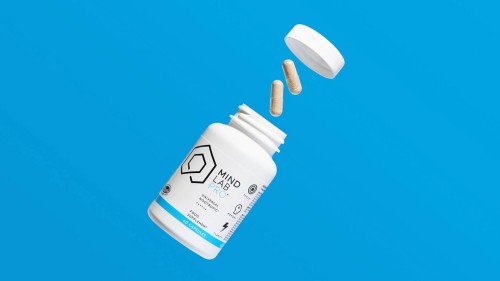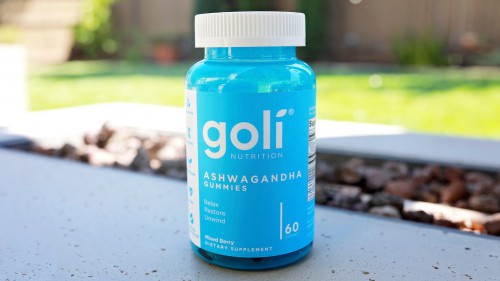11 Best Supplements for Anxiety and Stress, According to a Dietitian
Published on July 20, 2021
Medically Reviewed by Anthony Dugarte, MD
While stress is a normal part of life, it can have a significant impact on our health and wellness. Luckily, there are many supplements that can help reduce the physical effects of stress to help you cope better.


If you’re feeling anxious and stressed out, you’re not alone. In fact, anxiety is the most common mental health condition in the United States, affecting approximately 40 million adults. (1)
We live in a stress-provoking world, where it’s the norm to be in a constant state of stress. Plus, since the global pandemic started, levels of stress and anxiety are at an all-time high.
Stress and anxiety can be caused by several factors, with the most common being job, money, relationships, and health. Stress can be acute or chronic in nature, with chronic stress being more of a concern.
Whether you know it’s there or not, chronic stress can impact your health. If not addressed, it can lead to fatigue, sleep problems, weight gain, headaches, indigestion, irritability, anger, or health problems such as high blood pressure. (2)
While we can’t eliminate all stress in our lives, there are things you can do to manage it better and prevent it from impacting your health.
One necessary component of managing stress and anxiety is proper nutrition. Getting the vitamins and nutrients that your body needs in the right amounts can make all the difference in feeling calmer.
Here are my recommendations for the 11 best supplements for managing stress and anxiety.
1. B-Complex Vitamins
B-complex consists of the 8 B-vitamins, which may play a role in reducing stress and anxiety. They are also essential for proper heart and brain health.
B-vitamins support a healthy metabolism by converting our food into usable energy. Because of this, many people take B-complex supplements with the hopes of increasing their energy levels.
Higher doses of B vitamin supplements may reduce feelings of stress, improve mood, and increase energy, according to a 2016 research review. (3)
It is thought to do this by lowering homocysteine levels in the body, a hormone that increases stress and cardiovascular disease risk.
However, it’s not yet clear whether people who already have lower homocysteine levels will experience these same benefits.
Another 2014 study showed this same stress-reducing effect in those taking B-vitamins, particularly those experiencing work-related stress. (3)
In these cases, the vitamin B complex was taken on its own in an isolated supplement. However, many multivitamin supplements contain B-vitamins, which may also supply adequate amounts. (4)
Food sources rich in B-vitamins include grains, legumes, dairy, meats, eggs, and leafy greens.
If you are eating these types of foods regularly and also taking a multivitamin, you likely do not need an additional supplement.
However, if your B-vitamin levels are low and you’re feeling stressed, prioritizing these foods and a possible supplement should be considered.
B-complex supplements are generally safe when taken as directed. However, they may cause side effects such as nerve pain if taken in doses much higher than the recommended amounts. (5)
Interestingly, some studies have shown that taking B-vitamins in excessive doses—specifically B6—can cause symptoms similar to a deficiency. (6)
Always consult with your doctor before starting a new supplement.
2. Magnesium
Magnesium is an essential mineral found in many foods. It may serve as a natural anxiety treatment as it plays a role in relaxation. It is also involved in many important bodily functions.
Several studies demonstrate the potential for magnesium to help manage anxiety.
For example, a 2010 research review listed magnesium as one mineral that may serve as an anxiety treatment that is generally well tolerated. (7)
It is said that magnesium may reduce anxiety by regulating brain function and improving neurotransmitter communication, which can help the body better respond to stress.
Another more recent 2017 research review showed that those taking magnesium had reported less general anxiety. (8)
Overall, it appears there is a need for larger, higher-quality studies to confirm this effect, but there is definite potential.
The RDA (Recommended Dietary Allowance) for magnesium is 310–320 mg for women and 400–420 mg for men daily. (9)
Magnesium is found in many foods and is available as a supplement. Foods high in magnesium include leafy greens, avocado, legumes, whole grains, nuts, seeds, and dark chocolate.
As a supplement, magnesium is found in several forms. Magnesium citrate is most easily absorbed by the body. Magnesium supplements are generally well tolerated when taken as directed. (10)
The most common side effects of magnesium supplements are nausea and diarrhea. (11)
This is more often found when taking certain forms of magnesium, such as magnesium chloride, carbonate, or oxide.
Always check with your doctor first to understand your magnesium needs.
3. L-Theanine
L-theanine is an amino acid (protein-building block) most commonly found in green tea leaves. It has been studied for its role in reducing stress and anxiety and promoting relaxation.
An extensive research review demonstrated that green tea consumption may reduce feelings of anxiety and improve memory and attention. On average, one green tea bag contains around 20 mg of l-theanine. (12, 13)
L-theanine is also found in significantly higher doses ranging from 200–600 mg in supplement form.
A small study was conducted involving 34 people taking a higher dose of l-theanine. (14)
Those who drank a beverage containing 200 mg of l-theanine and other nutrients had lower levels of the stress hormone cortisol.
When cortisol levels are chronically high, it can increase feelings of stress and anxiety and negatively impact health. (15)
There is no set RDA or dosage recommendation for L-theanine at this time, but doses from 200–600 mg have been seen to be safe. (16)
4. Vitamin D
Vitamin D is a fat-soluble vitamin that provides numerous health benefits, including supporting nerve and brain health. It may also play a role in managing mood and anxiety.
Some research has shown those with anxiety had a higher likelihood of vitamin D deficiency. (17)
Another 2017 study including diabetic women showed that those taking vitamin D supplements experienced improved anxiety. (18)
Vitamin D is found in food, from UV rays, and supplements. Foods high in vitamin D include fatty fish like salmon, tuna, and mackerel, mushrooms, fortified dairy, and eggs.
Vitamin D deficiency is very common, affecting approximately 41% of the population. (19)
While some foods contain vitamin D, it can be difficult to get enough through your diet if you don’t eat them regularly.
Getting more direct sunlight is probably one of the most effective methods of improving your vitamin D levels, as the sun’s UV rays convert vitamin D in your skin to its most active form.
However, for those who live in colder climates, getting enough sunshine may be a challenge.
Vitamin D supplements are available at varying doses to help meet your vitamin D requirements.
The RDA for vitamin D is 600–800 IU (international units) per day, depending on your age. (20)
However, if you have an actual deficiency, you likely need a higher dose.
Get your vitamin D levels checked with your doctor to see if you need a supplement.
5. Ashwagandha
Ashwagandha is an adaptogenic herb native to India. An adaptogen is an herb that may reduce levels of anxiety, stress, and fatigue.
It does this by enhancing your body’s ability to combat physical and mental stress.
In a 2019 randomized trial, those taking 240 mg of ashwagandha extract saw greater reductions in stress, anxiety, and depression. (21)
Another 2019 study involved giving an ashwagandha supplement for 60 days, which was shown to be safe and effective for relieving stress. (21)
Since ashwagandha is considered an herbal extract, there is no known RDA for the amount to be taken at this time.
Ashwagandha is found in supplements only. In most studies, 200–300 mg of ashwagandha was given with minimal side effects. (22)
Overall, ashwagandha does have the potential to improve mood and anxiety levels. However, check with your doctor if you’re considering taking ashwagandha to determine what’s best for you.
6. Melatonin
Proper sleep quality and duration helps to combat stress. Melatonin is a hormone naturally found in our body that regulates our sleep-wake cycle, i.e., our circadian rhythm. (23)
While we naturally make some melatonin, the ability to do so decreases with age. (24)
According to a 2004 research review, taking melatonin reduced the time needed to fall asleep, increased total sleep time, and improved sleep quality compared to placebo. (24)
Melatonin is found in supplement form, in doses ranging from 0.3–10 mg. It is recommended to start with the lowest dose and slowly increase as needed based on tolerance. (25)
Overall, supplementing with melatonin may reduce stress indirectly by improving sleep.
It is non-habit forming with a good safety profile. Some side effects may include headaches, dizziness, or drowsiness. (26)
If you’re thinking about taking melatonin, check with your doctor first.
7. Rhodiola
Rhodiola is an herb grown in the cold regions of Russia and Asia. Like ashwagandha, Rhodiola is also considered an adaptogen that can increase the body’s resistance to stress.
An 8-week study was done involving 100 participants. Symptoms such as chronic fatigue, poor sleep quality, and short-term memory and concentration impairments were measured. (27)
Those supplemented with 400 mg of Rhodiola extract daily saw improved symptoms after just one week.
There is no set RDA determined for the ideal dose for a Rhodiola supplement. However, in most supplements, 400 mg is a common dose that has been researched in studies.
Supplementing with Rhodiola may improve symptoms of stress and fatigue with minimal risk for side effects. (28)
Some experience headaches, a dry mouth, or excessive saliva production when taking Rhodiola. (29)
8. Fish Oil
Fish oil provides a multitude of health benefits, mainly from the healthy omega-3 fats it contains.
These omega-3 fats, named DHA and EPA, are heart-healthy fats that may improve mood and decrease feelings of anxiety. (30)
Research has shown that those who suffer from increased stress or anxiety tend to have lower omega-3 levels. Therefore, getting more omega-3 rich foods or taking a supplement may help. (31)
One randomized controlled trial showed those taking 2,500 mg per day of fish oil experienced lower levels of anxiety and inflammation. However, this is considered a fairly high dose. (32)
Foods rich in DHA and EPA include fatty fish like salmon, tuna, sardines, and mackerel, seaweed, and fortified dairy and eggs. Seaweed is the only vegetarian source of these omega-3’s.
If you are a vegetarian or don’t eat these foods regularly, you may need a supplement. The RDA for DHA and EPA ranges from 1100-1600 mg per day, depending on age and sex. (33)
Side effects of fish oil supplements are rare but check with your doctor to find out the best option for you. (34)
If you take blood clotting medications, it is still unclear if fish oil will interact with these medications.
9. Valerian Root
Valerian root is a common ingredient found in dietary supplements that has been used for centuries as an herbal remedy.
Its most common uses are for nervousness, insomnia, headaches, and stress. It may decrease stress indirectly by improving sleep, or it’s also possible that it directly affects neurotransmitter levels in the brain.
A chemical known as gamma-aminobutyric acid (GABA) is a neurotransmitter that plays a role in our mood and sense of calm. (35)
There is thought that taking valerian root may increase levels of GABA in the body, exerting a calming effect. (36)
There is currently no set RDA for how much valerian root to take, but the optimal dose seen in studies is around 400 mg per day. (37)
Side effects are relatively rare but include headache, digestive upset, and dizziness.
Check with your medical doctor before starting this supplement to determine what’s best for you.
10. Kava
Kava is a tropical evergreen shrub native to the South Pacific islands. The kava roots have been used in traditional ceremonies and made into a beverage called kava kava.
Kava contains active ingredients known as kavalactones, which are said to be capable of reducing stress. (38)
It is thought to do this by inhibiting the breakdown of GABA so that our mood remains stable.
In doing this, it can decrease the activity of our nervous system and exert a calming effect.
A 2003 research review also found that kava extract relieved levels of anxiety in the short term. (39)
Kava can be taken in tea, capsule, powder, or liquid form. There is currently no RDA set for how much kava to take in supplement form.
However, its use appears to be generally safe when taken at a daily dose of 120–280 mg daily for up to 4-8 weeks. (40)
Consult with your medical doctor to see what’s best for you regarding this supplement.
11. Glycine
Glycine is an important amino acid (protein-building block) that your body uses to create proteins. It also may play a role in managing stress.
In particular, studies have found that glycine may increase your body’s resistance to stress. It may do this by encouraging a good night’s rest. (41)
Since improved sleep can reduce overall feelings of stress, glycine may indirectly lower stress in this way.
It is also said that glycine may work to lower our core body temperature, which helps promote more comfortable and sound sleep. (42)
In a 2016 study, taking 3 grams of glycine before bedtime was shown to improve measures of sleep quality and performance on memory recognition tasks. (43)
Glycine is also generally well tolerated. There is no RDA set for how much to take, but 3 grams is a common dosage recommendation that is seen to be safe. (44)
Overall, glycine may be beneficial for improving sleep, and consequently, reducing our stress levels. Consult with your doctor prior to taking glycine to weigh the pros and cons.
The Bottom Line
Stress can be caused by many things, such as your job, money, health, or relationship factors.
While feelings of stress and anxiety are incredibly common, they don’t have to be.
The vitamins and supplements mentioned in this article may help increase your body’s resistance to the common stressors, allowing you to live life in a more relaxed, calm state.
Always consult with your healthcare provider before starting a new supplement. This is especially important if you’re taking other medications, have medical conditions, are pregnant, or plan to become pregnant.
If stress or anxiety affects your quality of life, consider speaking with a medical professional or therapist about possible solutions.
At WellnessVerge, we only use reputable sources, including peer-reviewed medical journals and well-respected academic institutions.
- Anxiety and Depression Facts & Statistics:
https://adaa.org/understanding-anxiety/facts-statistics - Chronic Psychosocial Stress and Hypertension:
https://www.ncbi.nlm.nih.gov/pmc/articles/PMC3694268/ - B Vitamins and the Brain: Mechanisms, Dose and Efficacy—A Review:
https://www.ncbi.nlm.nih.gov/pmc/articles/PMC4772032/ - Effects of vitamin and mineral supplementation on stress, mild psychiatric symptoms, and mood in nonclinical samples: a meta-analysis:
https://pubmed.ncbi.nlm.nih.gov/23362497/ - Peripheral Neuropathy Due to Vitamin Deficiency, Toxins, and Medications:
https://www.ncbi.nlm.nih.gov/pmc/articles/PMC4208100/ - The vitamin B6 paradox: Supplementation with high concentrations of pyridoxine leads to decreased vitamin B6 function:
https://pubmed.ncbi.nlm.nih.gov/28716455/ - Nutritional and herbal supplements for anxiety and anxiety-related disorders: systematic review:
https://www.ncbi.nlm.nih.gov/pmc/articles/PMC2959081/ - The Effects of Magnesium Supplementation on Subjective Anxiety and Stress—A Systematic Review:
https://www.mdpi.com/2072-6643/9/5/429 - The Nutrition Source: Magnesium:
https://www.hsph.harvard.edu/nutritionsource/magnesium/ - Predicting and Testing Bioavailability of Magnesium Supplements:
https://www.ncbi.nlm.nih.gov/pmc/articles/PMC6683096/ - Magnesium Fact Sheet for Health Professionals:
https://ods.od.nih.gov/factsheets/Magnesium-HealthProfessional/#h8 - Green tea effects on cognition, mood and human brain function: A systematic review:
https://pubmed.ncbi.nlm.nih.gov/28899506/ - Theanine and Caffeine Content of Infusions Prepared from Commercial Tea Samples:
https://www.ncbi.nlm.nih.gov/pmc/articles/PMC4787341/ - Anti-Stress, Behavioural and Magnetoencephalography Effects of an L-Theanine-Based Nutrient Drink: A Randomised, Double-Blind, Placebo-Controlled, Crossover Trial:
https://pubmed.ncbi.nlm.nih.gov/26797633/ - Effect of increase in cortisol level due to stress in healthy young individuals on dynamic and static balance scores:
https://www.ncbi.nlm.nih.gov/pmc/articles/PMC6371989/ - Effects of chronic l-theanine administration in patients with major depressive disorder: an open-label study:
https://pubmed.ncbi.nlm.nih.gov/27396868/ - Vitamin D in Anxiety and Affective Disorders:
http://www.biomed.cas.cz/physiolres/pdf/64%20Suppl%202/64_S101.pdf - Vitamin D Supplementation Improves Mood in Women with Type 2 Diabetes:
https://www.hindawi.com/journals/jdr/2017/8232863/ - Vitamin D deficiency:
https://www.ncbi.nlm.nih.gov/pmc/articles/PMC6075634/ - Vitamin D Fact Sheet for Health Professionals:
https://ods.od.nih.gov/factsheets/VitaminD-HealthProfessional/ - An investigation into the stress-relieving and pharmacological actions of an ashwagandha (Withania somnifera) extract: A randomized, double-blind, placebo-controlled study:
https://pubmed.ncbi.nlm.nih.gov/31517876/ - A Prospective, Randomized Double-Blind, Placebo-Controlled Study of Safety and Efficacy of a High-Concentration Full-Spectrum Extract of Ashwagandha Root in Reducing Stress and Anxiety in Adults:
https://www.ncbi.nlm.nih.gov/pmc/articles/PMC3573577/ - Association between Sleep Duration and Perceived Stress: Salaried Worker in Circumstances of High Workload:
https://www.ncbi.nlm.nih.gov/pmc/articles/PMC5923838/ - Melatonin, human aging, and age-related diseases:
https://pubmed.ncbi.nlm.nih.gov/15582288/ - Optimal dosages for melatonin supplementation therapy in older adults: a systematic review of current literature:
https://pubmed.ncbi.nlm.nih.gov/24802882/ - Melatonin: What You Need To Know:
https://www.nccih.nih.gov/health/melatonin-what-you-need-to-know - Rhodiola rosea in Subjects with Prolonged or Chronic Fatigue Symptoms: Results of an Open-Label Clinical Trial:
https://pubmed.ncbi.nlm.nih.gov/28219059/ - Assessment report on Rhodiola rosea L., rhizoma et radix:
https://www.ema.europa.eu/en/documents/herbal-report/final-assessment-report-rhodiola-rosea-first-version_en.pdf - Rhodiola:
https://www.nccih.nih.gov/health/rhodiola - An adaptogenic role for omega-3 fatty acids in stress; a randomised placebo controlled double blind intervention study (pilot):
https://www.ncbi.nlm.nih.gov/pmc/articles/PMC538287/ - Food for Mood: Relevance of Nutritional Omega-3 Fatty Acids for Depression and Anxiety:
https://www.ncbi.nlm.nih.gov/pmc/articles/PMC6087749/ - Omega-3 Supplementation Lowers Inflammation and Anxiety in Medical Students: A Randomized Controlled Trial:
https://www.ncbi.nlm.nih.gov/pmc/articles/PMC3191260/ - Omega-3 Fatty Acids Fact Sheet for Health Professionals:
https://ods.od.nih.gov/factsheets/Omega3FattyAcids-HealthProfessional/ - Omega-3 Supplements: In Depth:
https://www.nccih.nih.gov/health/omega3-supplements-in-depth - Relaxation and immunity enhancement effects of gamma-aminobutyric acid (GABA) administration in humans:
https://pubmed.ncbi.nlm.nih.gov/16971751/ - Valeriana officinalis root extract suppresses physical stress by electric shock and psychological stress by nociceptive stimulation-evoked responses by decreasing the ratio of monoamine neurotransmitters to their metabolites:
https://bmccomplementmedtherapies.biomedcentral.com/articles/10.1186/1472-6882-14-476 - Valerian:
https://www.aafp.org/afp/2003/0415/p1755.html - Kavain, the Major Constituent of the Anxiolytic Kava Extract, Potentiates GABAA Receptors: Functional Characteristics and Molecular Mechanism:
https://www.ncbi.nlm.nih.gov/pmc/articles/PMC4917254/ - Kava extract for treating anxiety:
https://pubmed.ncbi.nlm.nih.gov/12535473/ - Kava for Generalized Anxiety Disorder: A Review of Current Evidence:
https://pubmed.ncbi.nlm.nih.gov/29641222/ - New therapeutic strategy for amino acid medicine: glycine improves the quality of sleep:
https://pubmed.ncbi.nlm.nih.gov/22293292/ - The sleep-promoting and hypothermic effects of glycine are mediated by NMDA receptors in the suprachiasmatic nucleus:
https://pubmed.ncbi.nlm.nih.gov/25533534/ - Glycine ingestion improves subjective sleep quality in human volunteers, correlating with polysomnographic changes:
https://link.springer.com/article/10.1111/j.1479-8425.2007.00262.x - Assessment of Acute Adverse Events of Glycine Ingestion at a High Dose in Human Volunteers:
https://www.jstage.jst.go.jp/article/seikatsueisei/50/1/50_1_27/_article






